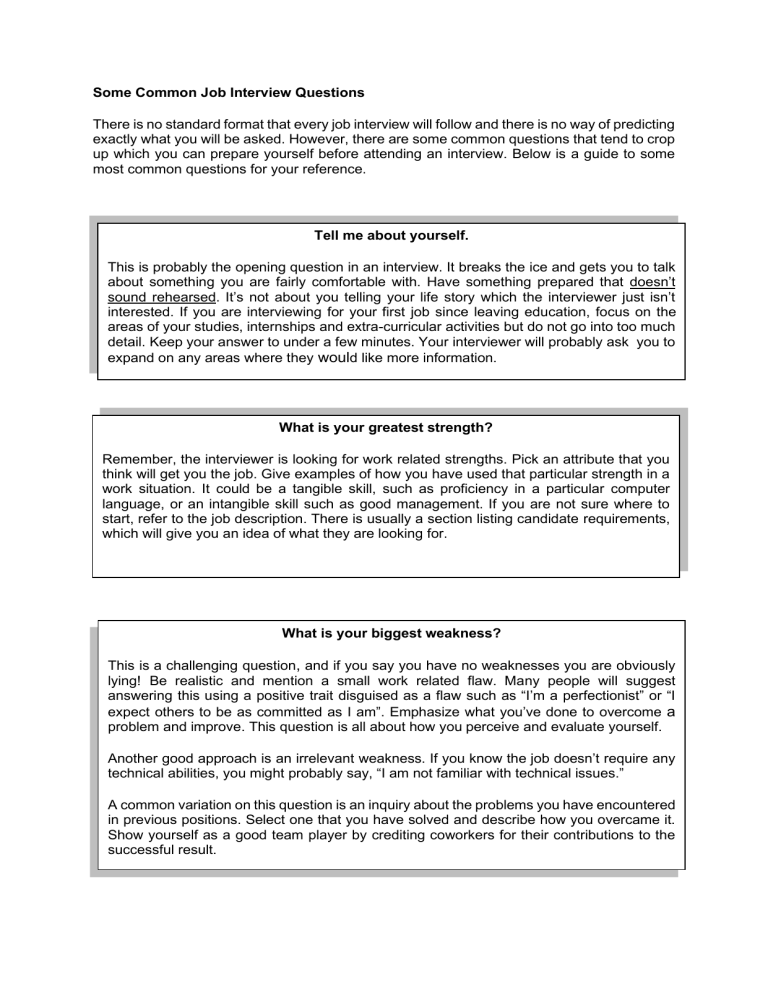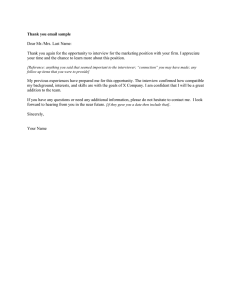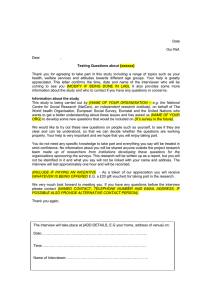
Some Common Job Interview Questions There is no standard format that every job interview will follow and there is no way of predicting exactly what you will be asked. However, there are some common questions that tend to crop up which you can prepare yourself before attending an interview. Below is a guide to some most common questions for your reference. Tell me about yourself. This is probably the opening question in an interview. It breaks the ice and gets you to talk about something you are fairly comfortable with. Have something prepared that doesn’t sound rehearsed. It’s not about you telling your life story which the interviewer just isn’t interested. If you are interviewing for your first job since leaving education, focus on the areas of your studies, internships and extra-curricular activities but do not go into too much detail. Keep your answer to under a few minutes. Your interviewer will probably ask you to expand on any areas where they would like more information. What is your greatest strength? Remember, the interviewer is looking for work related strengths. Pick an attribute that you think will get you the job. Give examples of how you have used that particular strength in a work situation. It could be a tangible skill, such as proficiency in a particular computer language, or an intangible skill such as good management. If you are not sure where to start, refer to the job description. There is usually a section listing candidate requirements, which will give you an idea of what they are looking for. What is your biggest weakness? This is a challenging question, and if you say you have no weaknesses you are obviously lying! Be realistic and mention a small work related flaw. Many people will suggest answering this using a positive trait disguised as a flaw such as “I’m a perfectionist” or “I expect others to be as committed as I am”. Emphasize what you’ve done to overcome a problem and improve. This question is all about how you perceive and evaluate yourself. Another good approach is an irrelevant weakness. If you know the job doesn’t require any technical abilities, you might probably say, “I am not familiar with technical issues.” A common variation on this question is an inquiry about the problems you have encountered in previous positions. Select one that you have solved and describe how you overcame it. Show yourself as a good team player by crediting coworkers for their contributions to the successful result. Why should we hire you? This is an important question that you will need to answer carefully. It is your chance to stand out and draw attention to your skills, especially those that haven’t already been addressed. Saying “because I need a job” or “I’m really good” just won’t cut it. Don’t speculate about other candidates and their possible strengths or flaws. Make sure you focus on you. Explain why you make a good employee, why you are a good fit for the job and the company and what you can offer if you are given a chance. Keep it succinct and highlight your achievements. What salary are you expecting? This is always a tricky and dangerous game to play in an interview. It is a common mistake to discuss salary before you have sold yourself and like in any negotiation knowledge is power. Do your homework and make sure you have an idea of what this job is offering. You can try asking them what the salary range. If you want to avoid the question altogether you could say that at the moment you are looking to advance in your career and money isn’t your main motivator. If you do have a specific figure in mind and you are confident you can get it, then it may be worth going for it. *Important note : Bear in mind that the interview starts from the minute you walk into the building until you leave and are out of sight. Don’t think that just because you have left the meeting room, you are “off the hook”. You need to maintain an image of confidence, enthusiasm, competence, reliability and professionalism throughout.


